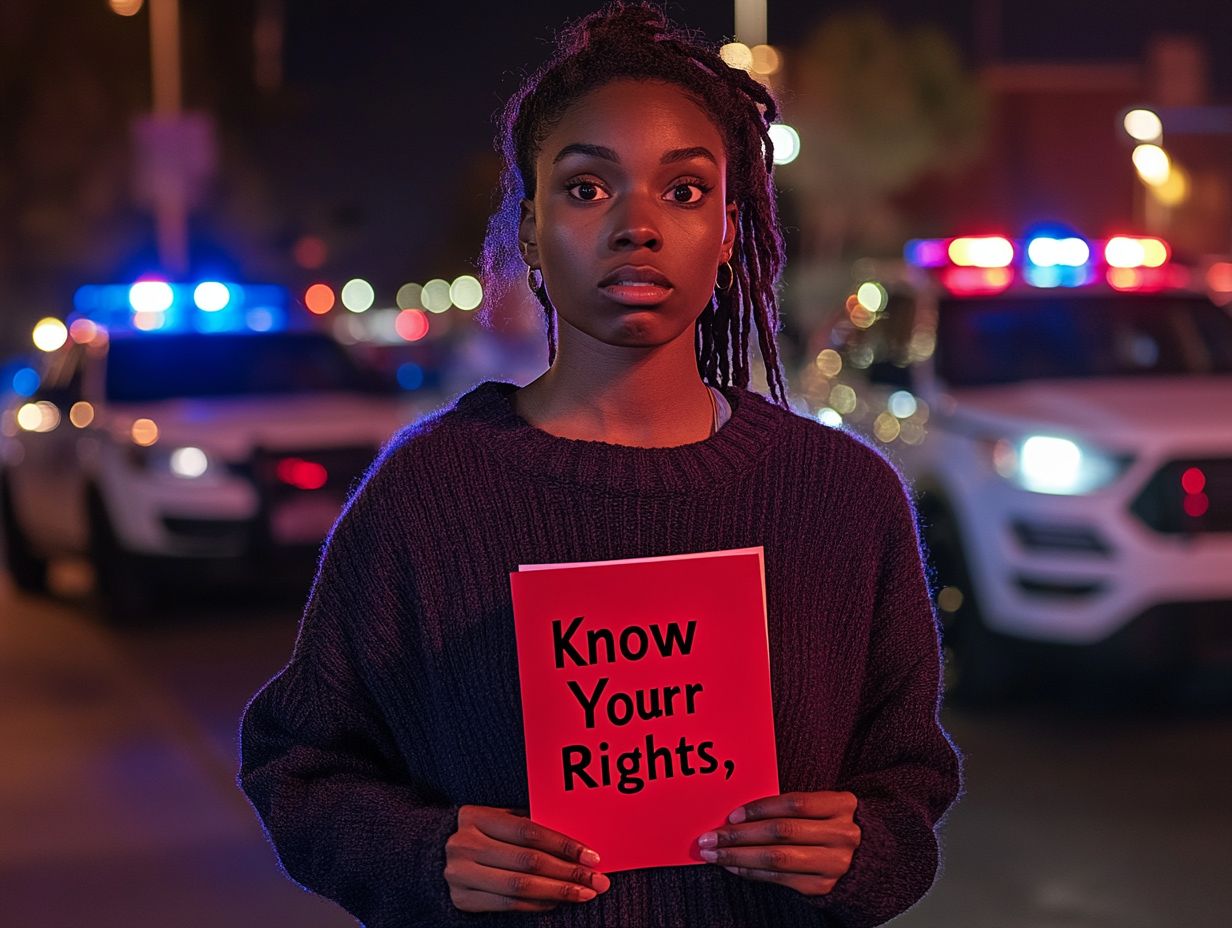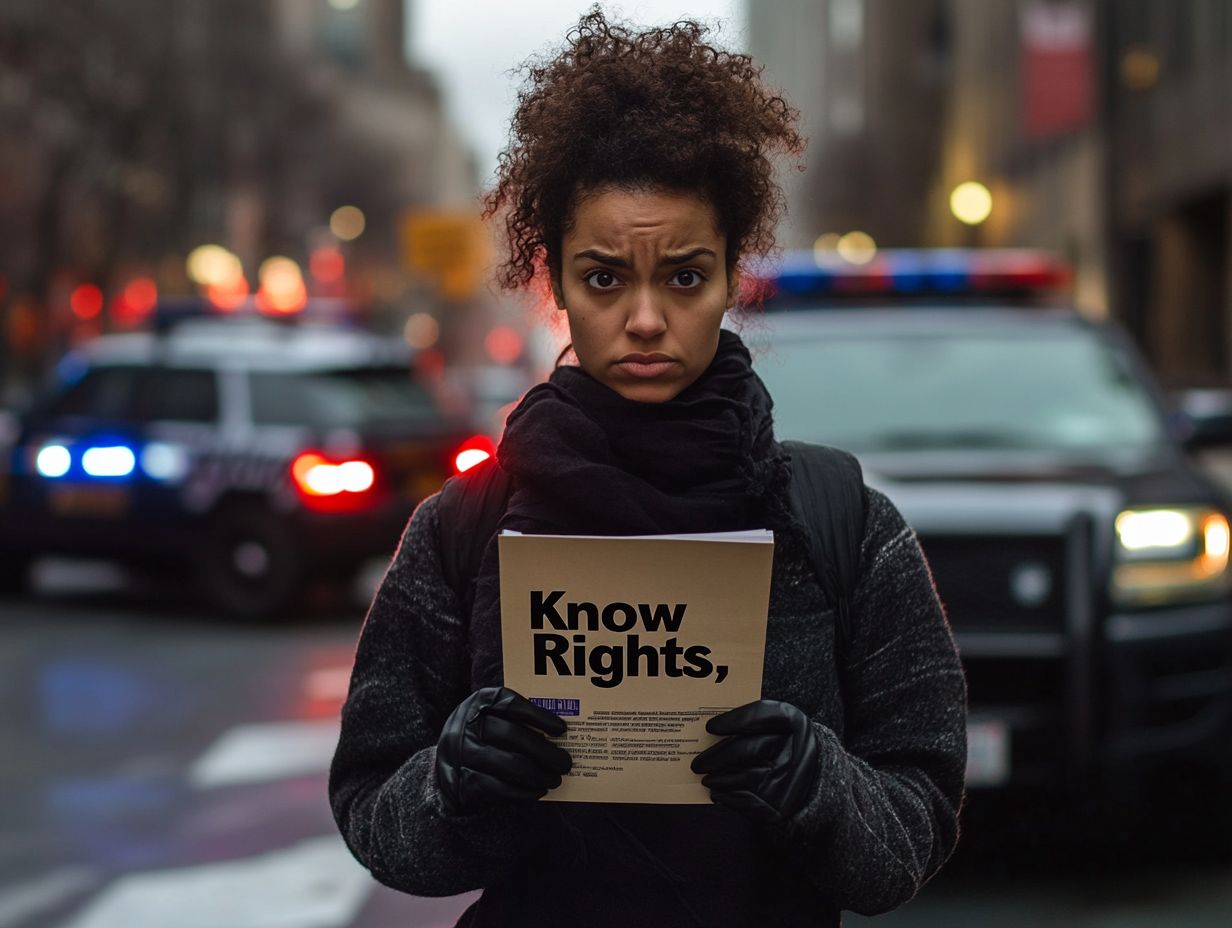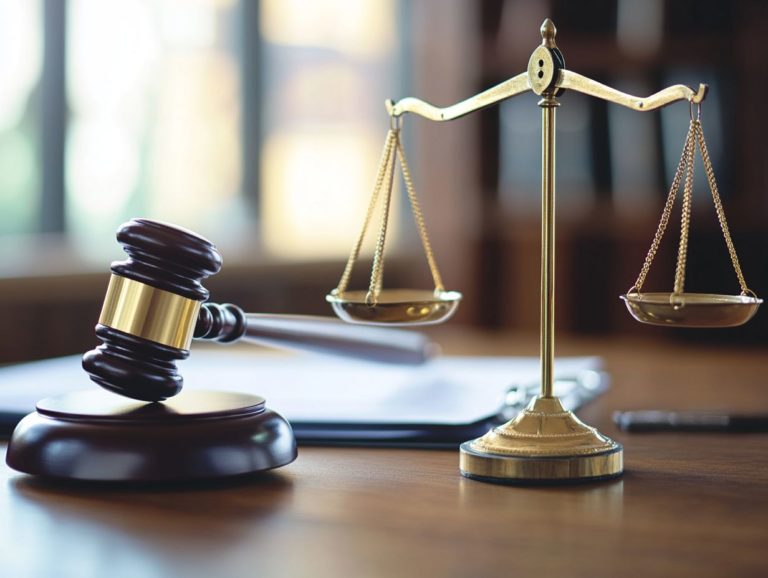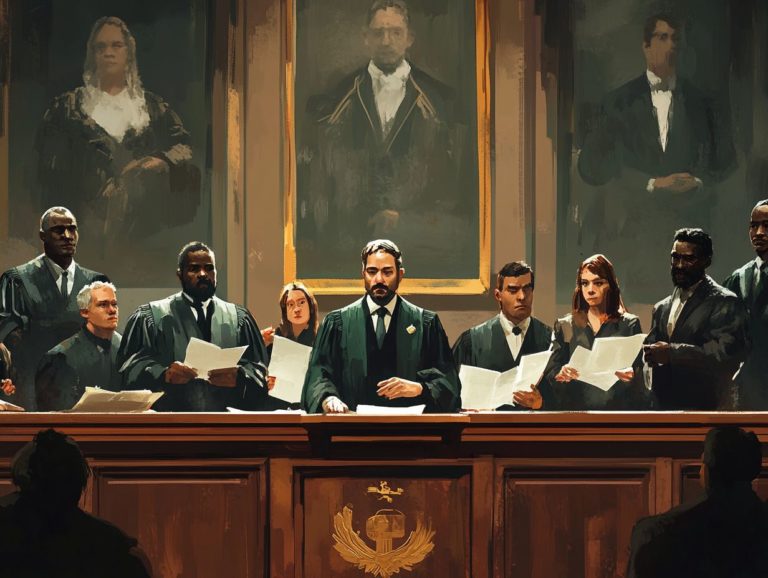How Can You Protect Your Rights During Arrest?
Being arrested can feel overwhelming and perplexing, but knowing your rights is essential for your protection.
This article explains your rights during an arrest, the necessary steps to protect your rights, and highlights common violations you may encounter. It also discusses the legal remedies available if your rights are compromised and provides practical advice to help you maintain composure and assertiveness in challenging circumstances.
Stay informed to navigate these moments with confidence!
Contents
- Key Takeaways:
- Understanding Your Rights During Arrest
- Steps to Take During an Arrest
- Common Violations of Rights During Arrest
- Legal Actions to Protect Your Rights
- Tips for Protecting Your Rights During an Arrest
- Frequently Asked Questions
- Got questions about your rights during an arrest?
- What are my rights during an arrest?
- How can I protect my right to remain silent during an arrest?
- Can I refuse to be searched during an arrest?
- What should I do if I believe my rights have been violated during an arrest?
- Do I have the right to an attorney during an arrest?
- Can I be released from custody if my rights were violated during an arrest?
Key Takeaways:

Know your rights during an arrest to protect yourself.
Stay calm and assertive, invoke your right to remain silent, and request an attorney.
Act now! If your rights are violated, take immediate legal action by filing a complaint or working with a civil rights attorney.
Understanding Your Rights During Arrest
Knowing your rights during an arrest is essential for safeguarding your legal representation and ensuring your constitutional rights remain intact.
When confronted with police questioning, it’s vital to be aware of the protections afforded by the Fourth and Fifth Amendments. These amendments shield you from unlawful searches, seizures, and self-incrimination. Knowing your rights is critical for your safety, especially in places like Orange County, California, where law enforcement practices and legal standards can differ significantly.
What Are Your Rights?
Your rights during an arrest are vital and include the right to remain silent, the right to legal counsel, and protection against unreasonable searches and seizures. Under the Fifth Amendment, you have the right to avoid self-incrimination, while the Fourth Amendment protects you from unlawful police conduct. Understanding these rights is crucial to ensure fair treatment throughout the process.
The right to remain silent means you can choose not to answer questions posed by law enforcement, helping you avoid making statements that could be used against you in court. This right is crucial for your self-protection during police encounters.
The right to legal counsel is essential; having an attorney present can significantly influence the outcome of your legal proceedings. The Fourth Amendment s protection against unreasonable searches ensures you are not subjected to invasive police actions without just cause.
Miranda rights are the warnings given to you by police, informing you of your rights during an arrest. Their significance cannot be overstated, as they safeguard you from involuntary confessions and unlawful procedures.
Steps to Take During an Arrest
Knowing the right steps to take during an arrest can profoundly influence your experience and subsequent legal proceedings.
Maintaining a calm and cooperative demeanor with law enforcement is crucial. However, it’s equally important to recognize when to exercise your right to remain silent and request legal counsel.
This strategy protects your legal rights and ensures you receive the essential guidance you need during a challenging time.
Remain Calm and Cooperative
Remaining calm and cooperative during an arrest can significantly influence the outcome of your encounter with police officers and any subsequent legal proceedings.
By presenting yourself as non-threatening, you can de-escalate potential confrontations and create a smoother process where you can seek legal representation without complications. Staying composed fosters a positive atmosphere and facilitates clearer communication.
This means listening attentively to the officers’ instructions and responding respectfully. Officers tend to appreciate a cooperative attitude, which can help mitigate misunderstandings and reduce tension.
Your demeanor can dramatically affect how the situation unfolds. Having a lawyer ready to assist you can provide invaluable guidance in navigating the legal system effectively, reinforcing the importance of remaining calm while asserting your rights.
Invoke Your Right to Remain Silent

Your right to remain silent is a key protection under the Fifth Amendment. It helps you avoid saying things that could hurt you later.
This right prevents pressure and misuse of any statements you make. When you assert it, you’re taking an important step to protect yourself in court.
The consequences of not exercising this right can be severe. Anything you say during questioning may be seen as an admission of guilt. Knowing how and when to communicate this right is vital for anyone facing legal scrutiny.
Request an Attorney
Requesting an attorney during an arrest is critical for protecting your legal rights. The moment you say you need legal representation, police must stop questioning until your attorney arrives.
This moment allows you to get the expert advice you need right now! It protects you from pressure tactics or misleading information from law enforcement.
A knowledgeable criminal defense attorney not only informs you of your rights but also safeguards your interests throughout the process. By securing legal counsel promptly, you can navigate the complexities of criminal charges more effectively.
Common Violations of Rights During Arrest
Common violations during an arrest can lead to unlawful actions or police misconduct, affecting the legal process and evidence quality.
Being aware of these potential violations enables you to challenge them effectively and protect your rights in the criminal justice system.
Examples of Unlawful Arrests
Unlawful arrests often occur when there is a clear lack of probable cause. Probable cause means there must be a reasonable basis for believing a crime was committed.
Imagine being wrongfully apprehended simply because you fit a vague description or were in the wrong place at the wrong time, without any evidence or behavior suggesting criminal activity.
Legal Actions to Protect Your Rights
Taking legal action to protect your rights after an arrest is essential for ensuring accountability for any violations during your encounter with law enforcement.
You have several options, such as filing a complaint with the police department or pursuing a lawsuit.
Engaging a civil rights attorney can provide valuable guidance through this intricate process, allowing you to navigate your path with confidence and clarity.
Filing a Complaint or Lawsuit

Filing a complaint or lawsuit after an arrest is a crucial step to address police misconduct. Engaging a civil rights attorney can simplify this process, guiding you through the legal system and increasing your chances of success.
Start by carefully writing down every detail of the incident. Include your interactions with police and the names of any witnesses. Preserve any physical evidence, like photographs of injuries or medical records, as these can strengthen your case.
Once you have the details, you can either file a formal complaint with the police department or pursue a lawsuit. A knowledgeable civil rights attorney will help you understand the specific violations and represent your experiences effectively.
This process seeks accountability and deters future misconduct.
Working with a Civil Rights Attorney
A civil rights attorney offers vital legal representation when pursuing your complaint or lawsuit. Their expertise ensures your rights are protected and guides you through the legal complexities.
These professionals understand civil rights law and will advocate fiercely against unjust treatment. By leveraging their knowledge, you protect your rights and gain a clearer perspective of the legal landscape.
Partnering with a skilled attorney significantly boosts your chances of a favorable outcome. They will gather evidence, build a strong case, and confront injustices on your behalf.
Tips for Protecting Your Rights During an Arrest
Protecting your rights during an arrest requires an understanding of those rights. Stay assertive and document the arrest and any potential violations.
By staying informed and proactive, you can navigate the legal landscape to defend your constitutional rights effectively.
Know Your Rights and the Law
Understanding your rights is essential for safeguarding yourself during an arrest. Familiarizing yourself with your legal rights empowers you to advocate effectively within the system.
This knowledge brings clarity and confidence in encounters with law enforcement. Key rights, such as the Fourth Amendment s protection against unreasonable searches and seizures, the Fifth Amendment s guarantee against self-incrimination, and the Sixth Amendment s assurance of legal counsel, form a protective framework.
Being aware of these rights allows you to interact with officers more assertively, ensuring fair treatment. Ultimately, understanding these protections can lead to smoother interactions without intimidation.
Stay Calm and Assertive
Staying calm and assertive during an arrest helps you maintain control and ensures your legal rights are respected. This balance reduces tensions and facilitates clearer communication with police.
Remember, your response can significantly impact the outcome. Deep breaths can calm your nerves and promote a steady demeanor, encouraging civil dialogue.
Using respectful language minimizes misunderstandings while emphasizing your legal rights. A composed posture signals confidence and enhances your ability to articulate your thoughts with the police.
Ultimately, maintaining your composure benefits your immediate situation and upholds the integrity of your legal representation in future proceedings.
Document the Arrest and Any Violations

Writing down what happened during the arrest and noting any violations is essential to building a strong case if you choose to contest law enforcement’s actions. Record details such as the time, location, and any witnesses, as these can provide crucial evidence for your legal team.
It’s also important to note the specific actions of the law enforcement officers, any statements they made, and the individuals present during the incident. This detailed documentation can significantly influence legal proceedings by establishing a clear timeline and context surrounding your arrest.
Capturing physical evidence, like photographs of injuries or illegal substances, can strengthen your defense and highlight any misconduct. Such meticulous records become vital components that could sway a judge’s or jury’s perception, supporting your claims of rights being infringed during the encounter.
Frequently Asked Questions
Got questions about your rights during an arrest?
Here are some common queries answered!
What are my rights during an arrest?
During an arrest, you have the right to remain silent, the right to an attorney, and the right to be informed of the charges against you.
How can I protect my right to remain silent during an arrest?
You can protect your right to remain silent by clearly stating to the arresting officers that you wish to invoke this right and not answer any questions without an attorney present.
Can I refuse to be searched during an arrest?
Yes, you have the right to refuse a search of your person or property during an arrest. However, the police may still conduct a search if they have a warrant or a good reason to do so.
What should I do if I believe my rights have been violated during an arrest?
If you believe your rights have been violated during an arrest, stay calm and document the situation as much as possible. Then, contact a criminal defense attorney to discuss your options for taking legal action.
Do I have the right to an attorney during an arrest?
Yes, you have the right to an attorney during an arrest. If you cannot afford one, a public defender will be provided for you. It is important to exercise this right and have legal representation during the arrest process.
Can I be released from custody if my rights were violated during an arrest?
If your rights were violated during an arrest, it may be possible for your case to be dismissed or for the charges against you to be dropped. However, this will depend on the specific circumstances of your arrest and any evidence that was obtained unlawfully.
Know your rights! Stay prepared and informed.






